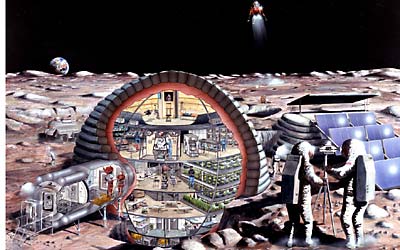An outer space solution to the Russia-Ukraine conflictby Vid Beldavs
|
| If a quarter of the military spending had gone into advanced space development, it could have been Russia-based asteroid mining companies that find and exploit the asteroids with trillions of dollars of recoverable resources. |
If innovation is the primary driver of economic development, Russia’s choice of emphasizing the military is likely to have disastrous consequences, further exacerbating its brain drain. Bright people, particularly scientists, will continue to leave to do great science elsewhere. Deputy Prime Minister Rogozin often speaks of building a Russian Moon base. The capital flight that has occurred over the years could have funded multiple lunar bases and possibly a base on Mars.
In 2014 the plans have become more elaborate, but less realizable after the Ukraine fiasco. Now Rogozin speaks of a permanent base, with a Russian presence on the Moon forever. Consider the money spent on the military after its modernization drive started in 2008. If a quarter of the hundreds of billions in military spending had gone into advanced space development, it could have been Russia-based asteroid mining companies that find and exploit the asteroids with trillions of dollars of recoverable resources. Instead it will be Deep Space Industries, SpaceX, Planetary Resources, and other American companies that will reap the rewards. Now that weapons have been purchased and the troops have been trained to use them, the impulse is to put the military to use. Russia is losing hundreds of billions due to a senseless war that did not have to take place.
The Ukraine crisis started as a result of a gross misreading of Ukrainian public opinion by Russian leadership. About 75% of the public was for joining the EU in the fall of 2013, eagerly anticipating President Yanukovych to sign the Association Agreement. In the Ukrainian parliament, the Verkhovna Rada, 318 votes out of 449 has been cast for joining the EU, reflecting strong support from all regions of the country. The people of Ukraine—Russian, Polish, Tatar, Ukrainian, and other nationalities—had the hope that their country could finally get on the road to prosperity where they could live like their European neighbors. President Yanukovych had been elected in 2010 on the basis of his advocacy for Ukraine joining the EU.
When Russian President Putin compelled the alternative solution, for Ukraine to join the new Eurasian Union led by Russia, the public was outraged. The Maidan revolution was a predictable consequence that had nothing to do with Victoria Nuland, NATO, or other Western influence. Russian interests would have been much better served if Yanukovych had simply been allowed to sign the EU Agreement. He would have increased his political standing in Ukraine while remaining a friend of Russia. Yanukovych is history, Petro Poroshenko is now president, and there have been thousands of casualties in a senseless war that harms Russia, Ukraine, and the EU. Economic growth in the EU is threatening to collapse, while the Russian and Ukrainian economies are imploding.
| A large-scale project that results in an investment of billions in the Russian, Ukrainian, and EU space and technology sectors could provide a highly visible re-unifier. |
The Russian and Ukrainian economies are deeply intertwined, particularly in the space and high technology sectors. The war in eastern Ukraine is affecting both economies and resulting in significant delays in Russian space efforts as Russia seeks to substitute its own production for imports from Ukraine.
It is time to consider a solution to the problems of the region. A large-scale project that results in an investment of billions in the Russian, Ukrainian, and EU space and technology sectors could provide a highly visible re-unifier that generates jobs in eastern Ukraine and bolsters science and industrial development in Russia and drives innovation in the EU to lift it back to a growth path. Why not reframe the Russia-Ukraine-EU relationship towards a mutually positive future? Deputy Prime Minister Rogozin has already given the answer: build the Moon base as a joint Russia-Ukraine-EU project. Better yet, why not expand the opportunity and invite the US, China, Japan, and others to join? There is an existing structure that could make it work. It is the International Space Station (ISS): the largest international cooperation effort in technology development in human history. In fact, the ISS has been nominated for the Nobel Peace Prize. Such a project could begin the drive for industrial development of the Moon and beyond, and create a permanent Russian presence on the Moon forever, in partnership with Ukraine, the EU and the rest of the world.
Stop the stupid war. Build the Moon base.
